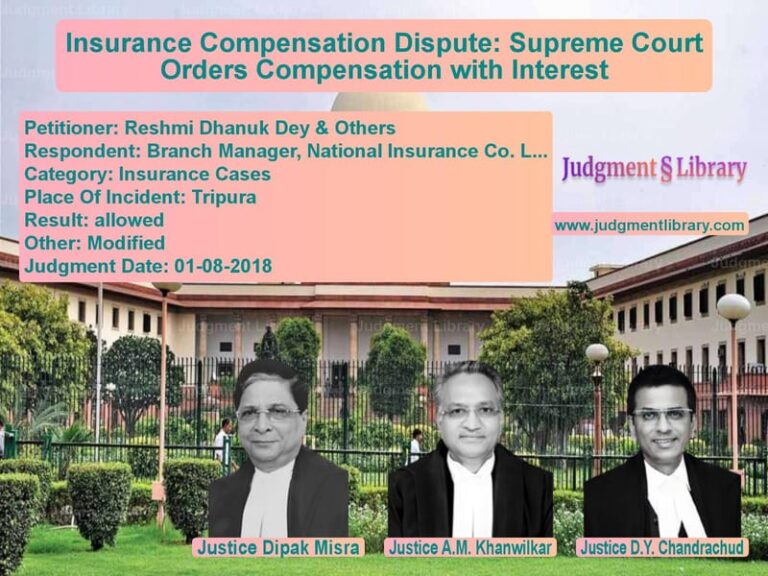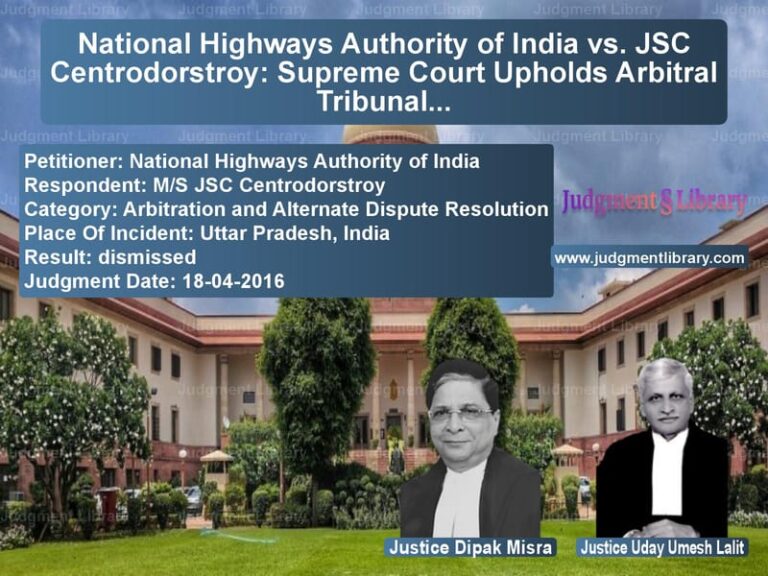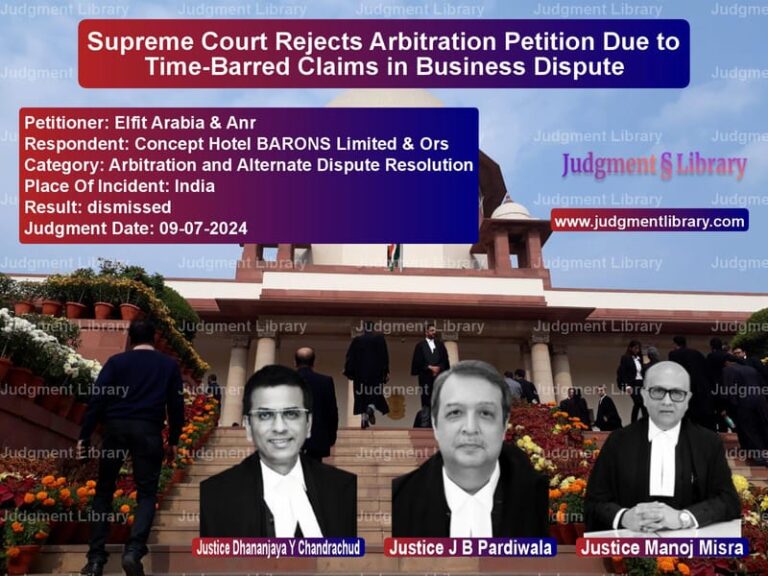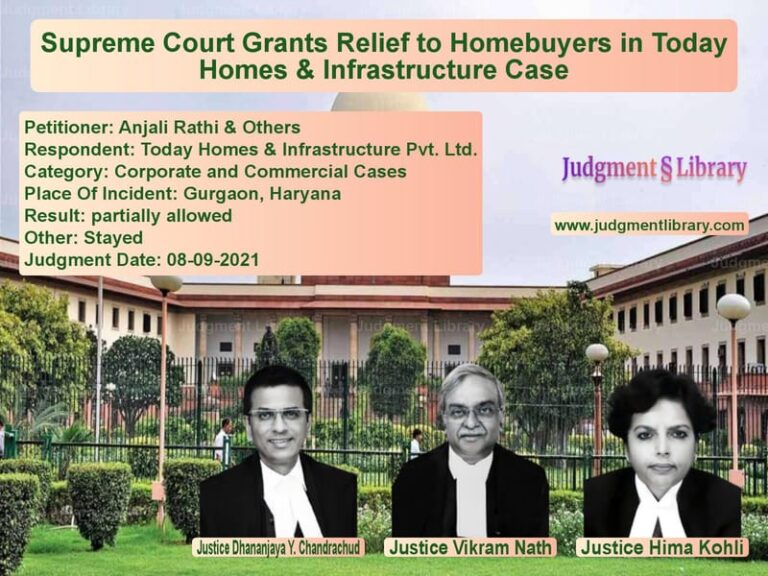Supreme Court Revisits Dawoodi Bohra Excommunication Case: Constitutional Morality vs. Religious Rights
The Supreme Court of India, in the case of Central Board of Dawoodi Bohra Community & Anr. vs. The State of Maharashtra & Anr., revisited the issue of excommunication within the Dawoodi Bohra community. The case primarily questioned whether the constitutional validity of the Bombay Protection of Ex-communication Act, 1949, which was struck down in Sardar Syedna Taher Saifuddin Saheb vs. State of Bombay (1962), needed reconsideration.
Background of the Case
The case originated from a challenge to the Ex-communication Act, which had prohibited the practice of excommunication in all religious communities. The 1962 ruling by the Supreme Court had held that excommunication within the Dawoodi Bohra community was an essential religious practice and thus protected under Article 26(b) of the Constitution, which guarantees religious denominations the right to manage their own affairs in matters of religion.
However, with the enactment of the Maharashtra Protection of People from Social Boycott (Prevention, Prohibition and Redressal) Act, 2016, the Ex-communication Act was repealed, prompting fresh legal scrutiny into whether the practice of excommunication remains constitutionally valid.
Arguments by the Petitioners (Central Board of Dawoodi Bohra Community)
- The petitioners argued that excommunication is a necessary tool for preserving the religious integrity and discipline of the Dawoodi Bohra community.
- They contended that the 1962 judgment correctly recognized excommunication as an internal religious matter falling within the purview of Article 26(b).
- The petitioners opposed any interference with this religious practice, asserting that it does not violate constitutional principles or fundamental rights.
- They argued that Article 26 is an absolute right and cannot be subjected to Article 14 (right to equality) or Article 21 (right to life and dignity).
Arguments by the Respondents (State of Maharashtra & Others)
- The respondents contended that excommunication leads to severe social and economic consequences, amounting to a civil death for the excommunicated individuals.
- They argued that the 1962 judgment needs reconsideration in light of evolving constitutional principles, particularly the expansion of rights under Articles 14, 19, and 21.
- The respondents invoked the doctrine of constitutional morality, stating that religious practices must align with fundamental constitutional values such as equality, dignity, and fraternity.
- They pointed out that the Maharashtra Social Boycott Act, 2016, was enacted to prevent discrimination and ensure social justice, making excommunication an obsolete and unconstitutional practice.
Supreme Court’s Analysis and Judgment
The Supreme Court considered whether the 1962 judgment required reconsideration. The key observations were:
- Evolution of Constitutional Law: The Court acknowledged that since the 1962 judgment, constitutional jurisprudence has expanded significantly, particularly in areas of fundamental rights and constitutional morality.
- Impact on Individual Rights: The Court noted that excommunication leads to ostracization, which affects an individual’s rights under Articles 14, 19, and 21.
- Interplay of Articles 25 and 26: The Court emphasized that while Article 26 grants religious denominations the right to manage religious affairs, it does not override other fundamental rights.
- Relevance of Constitutional Morality: The Court examined whether practices like excommunication can survive in a constitutional democracy where dignity, equality, and fraternity are paramount.
The Supreme Court ruled:
“The protection under Article 26(b) granted by the decision in Sardar Syedna Taher Saifuddin Saheb to the power to excommunicate a member of the Dawoodi Bohra community requires reconsideration as the said right is subject to morality, which must be understood in the light of constitutional morality.”
Key Legal Findings
- Relevance of Constitutional Morality: The Court emphasized that the notion of morality in Articles 25 and 26 must be interpreted as constitutional morality, which prioritizes dignity, non-discrimination, and social justice.
- Potential Repeal of the 1962 Judgment: The Court observed that the previous ruling was based on an outdated understanding of religious freedoms and may need to be re-evaluated.
- Need for a Larger Bench: The matter was referred to a nine-judge bench to address broader questions concerning the balance between religious rights and fundamental rights.
Final Verdict
- The Supreme Court directed that the case be tagged with the pending Sabarimala temple review, where similar constitutional questions regarding religious freedoms and fundamental rights are being examined.
- The Court refrained from making a final ruling but indicated that the legitimacy of excommunication must be reassessed in the context of modern constitutional principles.
- The judgment reaffirmed that religious practices must be in consonance with constitutional values, and long-standing religious customs may not be immune from judicial scrutiny.
Implications of the Judgment
This ruling is a landmark in redefining the balance between religious autonomy and individual rights in India. By referring the matter to a larger bench, the Supreme Court has acknowledged the necessity of re-examining traditional religious practices under evolving constitutional norms.
The decision has significant implications for religious communities, particularly those that practice forms of social exclusion. It signals that practices that lead to social ostracization and discrimination may not withstand constitutional scrutiny in the future.
By aligning religious freedoms with constitutional morality, this judgment paves the way for a more inclusive interpretation of fundamental rights, ensuring that religious practices do not override the dignity and freedoms of individuals.
Petitioner Name: Central Board of Dawoodi Bohra Community & Anr..Respondent Name: The State of Maharashtra & Anr..Judgment By: Justice Sanjay Kishan Kaul, Justice Sanjiv Khanna, Justice Abhay S. Oka, Justice Vikram Nath, Justice J. K. Maheshwari.Place Of Incident: Maharashtra.Judgment Date: 09-02-2023.
Don’t miss out on the full details! Download the complete judgment in PDF format below and gain valuable insights instantly!
Download Judgment: central-board-of-daw-vs-the-state-of-maharas-supreme-court-of-india-judgment-dated-09-02-2023.pdf
Directly Download Judgment: Directly download this Judgment
See all petitions in Fundamental Rights
See all petitions in Constitution Interpretation
See all petitions in Public Interest Litigation
See all petitions in Judgment by Sanjay Kishan Kaul
See all petitions in Judgment by Sanjiv Khanna
See all petitions in Judgment by Abhay S. Oka
See all petitions in Judgment by Vikram Nath
See all petitions in Judgment by J.K. Maheshwari
See all petitions in Remanded
See all petitions in supreme court of India judgments February 2023
See all petitions in 2023 judgments
See all posts in Constitutional Cases Category
See all allowed petitions in Constitutional Cases Category
See all Dismissed petitions in Constitutional Cases Category
See all partially allowed petitions in Constitutional Cases Category







